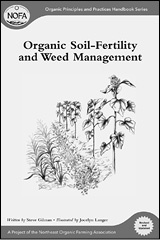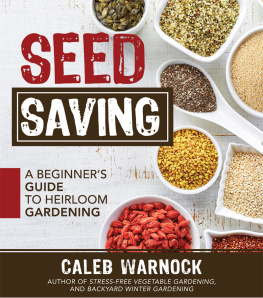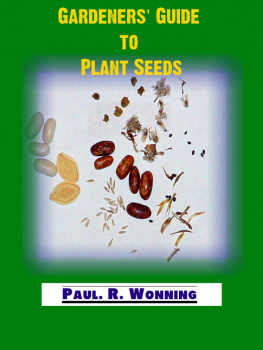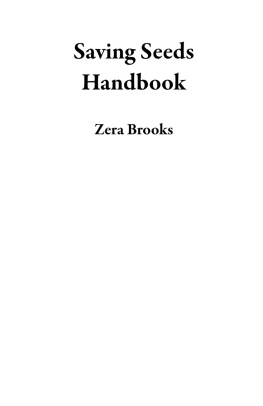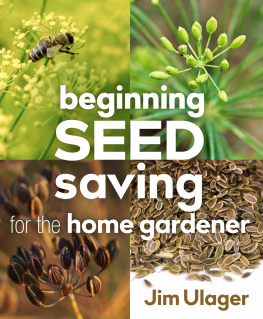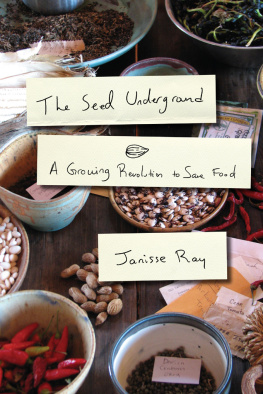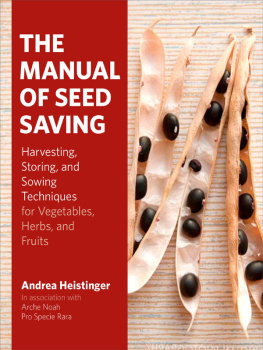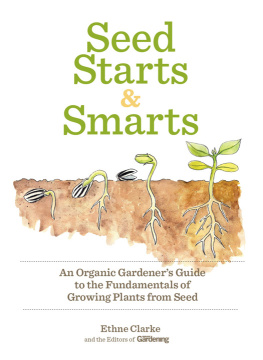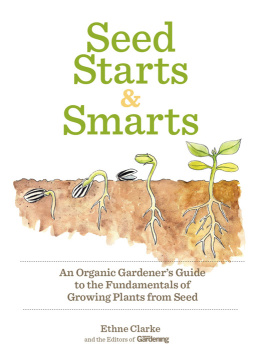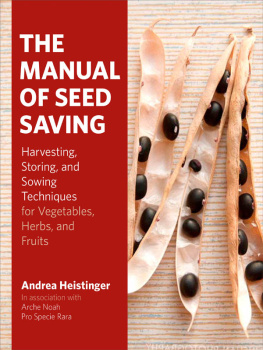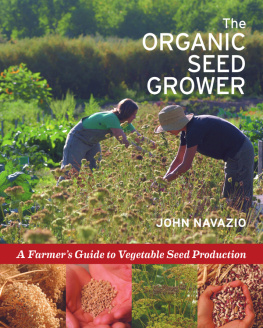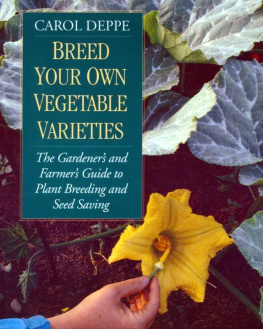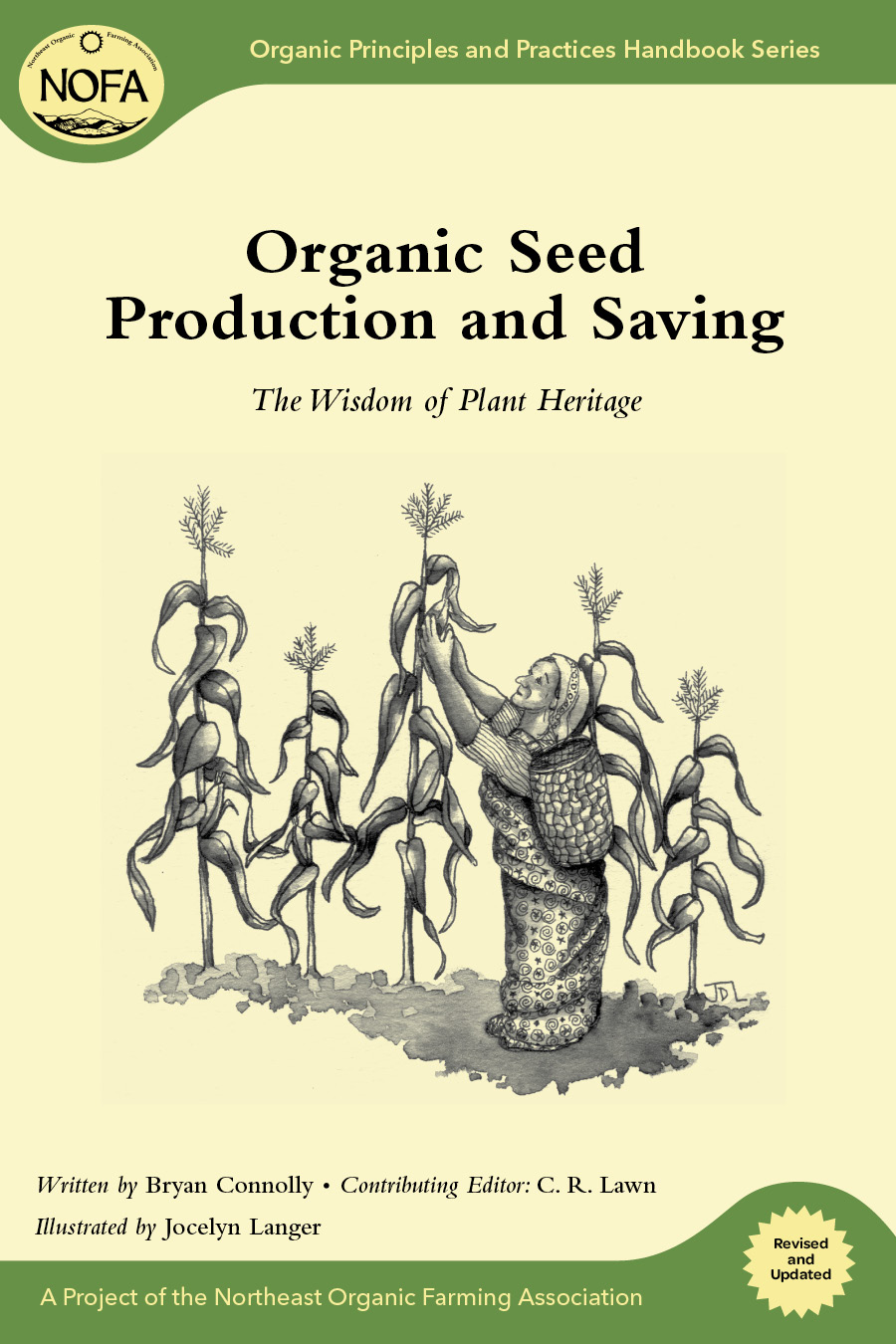
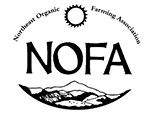
Organic Principles and Practices Handbook Series
A Project of the Northeast Organic Farming Association
Organic Seed Production and Saving
The Wisdom of Plant Heritage
Revised and Updated
Bryan Connolly
C. R. Lawn, Contributing Editor
Illustrated by Jocelyn Langer
Chelsea Green Publishing
White River Junction, Vermont
Copyright 2004, 2011 by the Northeast Organic Farming Association Interstate Council.
All rights reserved.
No part of this book may be transmitted or reproduced in any form by any means without permission in writing from the publisher.
Originally published in 2004 as The Wisdom of
Plant Heritage: Organic Seed Production and Saving.
Bee pollinating an echinacea blossom on page 26 adapted from Busy Bee by Wilfrank Paypa on Wikimedia Commons (http://commons.wikimedia.org/wiki/File:Frankeys_creation_-_Busy_BEE_%28by%29.jpg). All other photos by the author.
Editorial Coordinator: Makenna Goodman
Project Manager: Bill Bokermann
Copy Editor: Cannon Labrie
Proofreader: Helen Walden
Indexer: Peggy Holloway
Designer: Peter Holm, Sterling Hill Productions
Printed in the United States of America
First Chelsea Green revised and updated printing March, 2011
10 9 8 7 6 5 4 3 2 1 11 12 13 14
Our Commitment to Green Publishing
Chelsea Green sees publishing as a tool for cultural change and ecological stewardship. We strive to align our book manufacturing practices with our editorial mission and to reduce the impact of our business enterprise in the environment. We print our books and catalogs on chlorine-free recycled paper, using vegetable-based inks whenever possible. This book may cost slightly more because we use recycled paper, and we hope youll agree that its worth it. Chelsea Green is a member of the Green Press Initiative, a nonprofit coalition of publishers, manufacturers, and authors working to protect the worlds endangered forests and conserve natural resources. Organic Seed Production and Saving was printed on Joy White, a 30-percent postconsumer recycled paper supplied by Thomson-Shore.
Library of Congress Cataloging-in-Publication Data
Connolly, Bryan.
Organic seed production and saving : the wisdom of plant heritage / Bryan Connolly ; C.R. Lawn, contributing editor ; illustrated by Jocelyn Langer. -- Updated.
p. cm. -- (Organic principles and practices handbook series)
A Project of the Northeast Organic Farming Association.
Originally published in 2004 as The Wisdom of Plant Heritage: Organic Seed Production and Saving.
Includes bibliographical references and index.
ISBN 978-1-60358-353-4
1. Seed technology. 2. Organic gardening. 3. Vegetable gardening. 4. Vegetables--Seeds. 5. Vegetables--Propagation. I. Northeast Organic Farming Association. II. Title. III. Series: Organic principles and practices handbook series.
SB117.C717 2011
631.521--dc22
2011000417
eISBN: 9781603583541
Chelsea Green Publishing Company
Post Office Box 428
White River Junction, VT 05001
(802) 295-6300
www.chelseagreen.com
Best Practices for Farmers and Gardeners
The NOFA handbook series is designed to give a comprehensive view of key farming practices from the organic perspective. The content is geared to serious farmers, gardeners, and homesteaders and those looking to make the transition to organic practices.
Many readers may have arrived at their own best methods to suit their situations of place and pocketbook. These handbooks may help practitioners review and reconsider their concepts and practices in light of holistic biological realities, classic works, and recent research.
Organic agriculture has deep roots and a complex paradigm that stands in bold contrast to the industrialized conventional agriculture that is dominant today. Its critical that organic farming get a fair hearing in the public arenaand that farmers have access not only to the real dirt on organic methods and practices but also to the concepts behind them.
About This Series
The Northeast Organic Farming Association (NOFA) is one of the oldest organic agriculture organizations in the country, dedicated to organic food production and a safer, healthier environment. NOFA has independent chapters in Connecticut, Massachusetts, New Hampshire, New Jersey, New York, Rhode Island, and Vermont.
This handbook series began with a gift to NOFA/Mass and continues under the NOFA Interstate Council with support from NOFA/Mass and a generous grant from Sustainable Agriculture Research and Education (SARE). The project has utilized the expertise of NOFA members and other organic farmers and educators in the Northeast as writers and reviewers. Help also came from the Pennsylvania Association for Sustainable Agriculture and from the Maine Organic Farmers and Gardeners Association.
Jocelyn Langer illustrated the series, and Jonathan von Ranson edited it and coordinated the project. The Manuals Project Committee included Bill Duesing, Steve Gilman, Elizabeth Henderson, Julie Rawson, and Jonathan von Ranson. The committee thanks SARE and the wonderful farmers and educators whose willing commitment it represents.
Contents
I would like to thank C. R. Lawn for his editing and contributions, and for the assistance, interviews, information, and support I would like to thank Elisheva Rogosa, Rowen White, Harry Records, Michael Glos, Mark Hutton, Tom Stearns, Beth and Nathan Corymb, Jack and Anne Lazor, Diane Dorfer, Jonathan von Ranson, and Bill Duesing. Without their help this manual would not have been possible.
In this time of species extinction, homogenization, corporate gigantism, and the theft of commonly held genetic material as intellectual propertythe skills of seed saving are vital for small organic food producers and the whole of agriculture. Farmers and gardeners need to be able to produce their seeds as a basic, inalienable way to control their means of production. And a local organic agroecosystem requires an adapted seed source much as a community requires a memory.
Seed saving was the original skill that brought humanity agriculture. The faithful harvesting, planting, and selecting of wild plants eventually created our domesticated crops, which allowed humanity to transform a wild landscape into a cultivated field. The original landscape supported only 0.1 percent of biomass that humans could consume. After domestication, people were able to transform nearly 90 percent of that biomass into sustenance (Diamond 1997). This interaction of plants and humans, while it displaced wild processes and relationships, created surpluses, transforming societies of nomadic hunter-gatherers into sedentary populations. Once people settled and accumulated material wealth, the surpluses freed some from producing food and allowed a class of artisans, craftsmen, priests, and politicians to develop and technological advancement to occur. As the plants influenced people and civilization, people also kept refining plants. Millennia of cultivation, in different climates and for different uses and taste preferences, yielded a vast array of heirloom and locally adapted varieties among food and fiber crops.
Today we are heirs to approximately eleven millennia of humanplant interaction. A flip through the most recent Seed Savers Exchange Yearbook reveals an astounding diversity. This richness is our heritage, and we should preserve it if only to honor the efforts of seed-saving people throughout the ages. But maintaining this diversity is vital for three main reasons:

